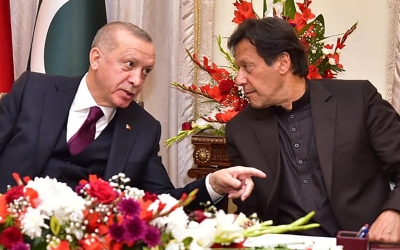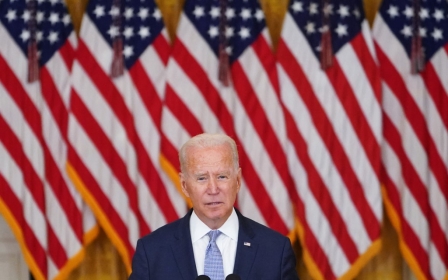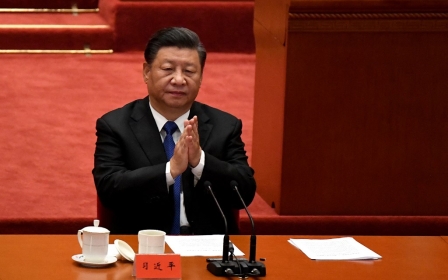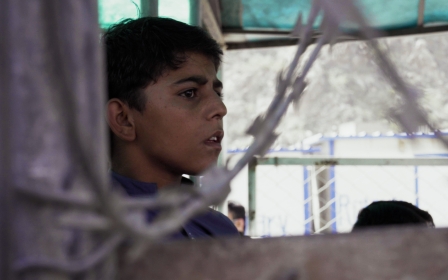Iranians fear warnings that their ties with Taliban would not last are coming true
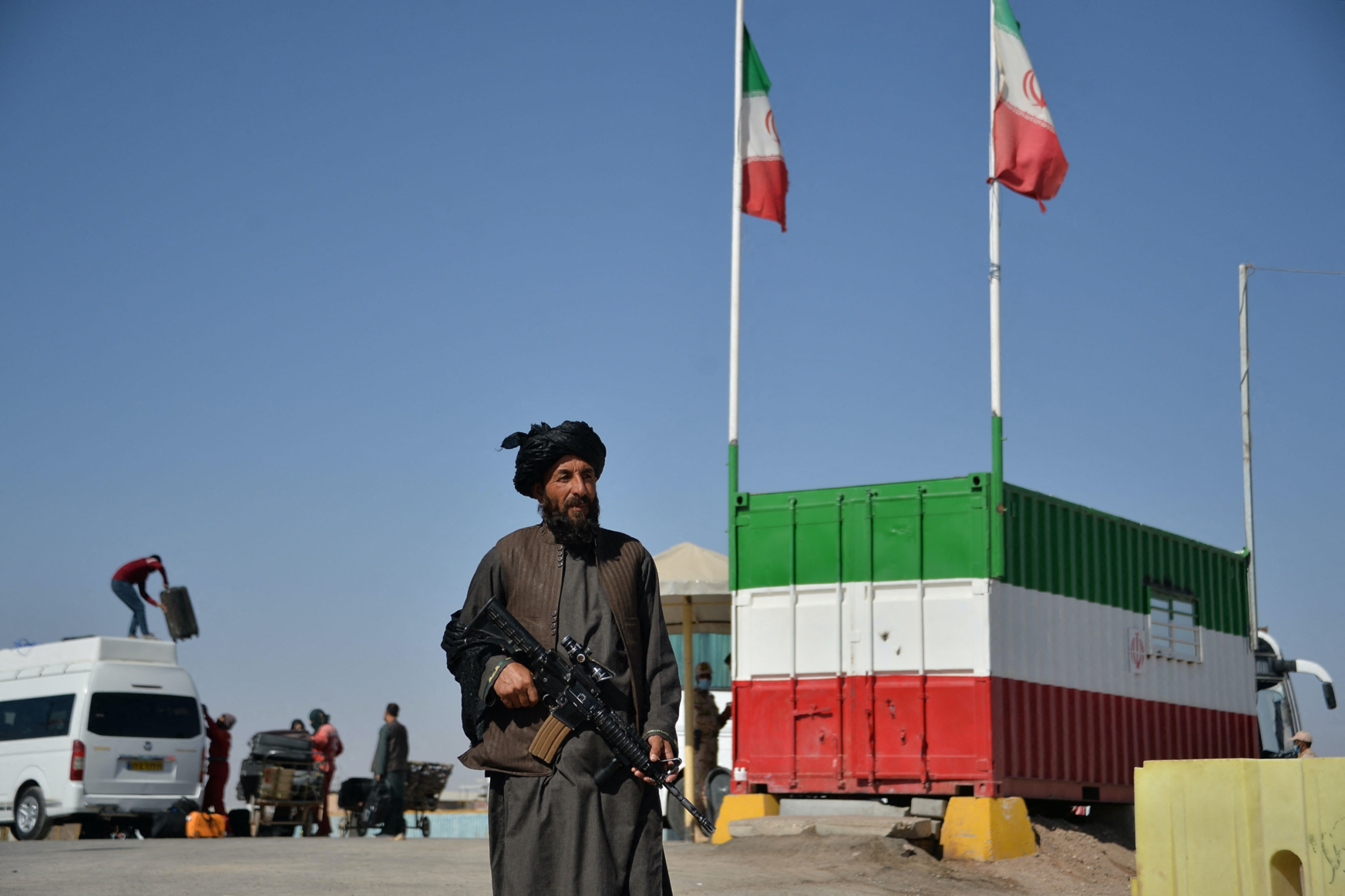
Over a month ago, a senior Iranian diplomat issued a warning that the Taliban, which recently regained control of Afghanistan, is a strategic threat right on Iran’s borders.
His warnings, which would prove to be justified within a matter of weeks, were dismissed.
“If the Taliban rules over Afghanistan with such an ideology, it will surely be a strategic threat to Iran. It is simplistic, thinking that the Taliban takeover will not affect our country,” Rasoul Mousavi, the director of the West Asia department at the Iranian foreign ministry, said on 28 October.
'Iran is worried that if it does not tolerate the Taliban's undiplomatic behaviour, Afghanistan will fall into the hands of Iran's enemies'
- Former Iranian diplomat
Hardliners vehemently attacked the veteran diplomat, who held the same position under the administration of moderate former president Hassan Rouhani, and called on the conservative Foreign Minister, Hossein Amir-Abdollahian, to relieve him of his duties. Amir-Abdollahian, however, did not listen to them.
On 1 December, Afghan news agency Amaaj released a video of an exchange of fire between Taliban forces and Iranian border guards. Soon after, Iran’s official news agencies confirmed the clashes, saying that the incident had taken place in the Shaghalak area of Nimruz province, near Sistan and Baluchestan province.
New MEE newsletter: Jerusalem Dispatch
Sign up to get the latest insights and analysis on Israel-Palestine, alongside Turkey Unpacked and other MEE newsletters
Meanwhile, videos emerged showing that several border checkpoints had fallen under the control of Taliban forces, but news agencies affiliated with the Islamic Revolutionary Guard Corps (IRGC) denied the reports.
A few hours later, Saeed Khatibzadeh, the spokesman for the Iranian Foreign Ministry, described the incident as a “border disagreement between frontiersmen” that was “managed and terminated” through “coordination between border guards of both sides”.
However, some unconfirmed reports claimed that the clashes had left casualties.
Iran's border with Afghanistan has long defined the country's relations with its neighbour, with the border the scene of activity by migrants, drug traffickers and armed groups. More importantly, two important rivers flow into Iran from Afghanistan - the Helmand and the Harirud - both of which are of paramount value to Tehran.
Following the clashes, IRGC-backed Tasnim news agency said that a few years ago, Iran erected a security wall hundreds of metres away from the Afghan border. Tasnim claimed that on the day of the border incident, the Taliban mistakenly thought the border was infiltrated when Iranian farmers crossed to the other side of the wall to access their farms, which fall on Iranian territory, and this led to clashes.
Reformists versus hardliners
Iranian reformists, who have been critical of Tehran’s diplomatic engagement with the Taliban over the past few years, lamented the government's current handling of the Taliban, which, up until a few months ago, was seen as no different from Islamic State in the eyes of average Iranians.
Abdollah Ramezanzadeh, the former spokesperson of former reformist president Mohammad Khatami, rebuked the government for its unclear plan regarding the issue.
“[Taliban] has begun its evil work on the borders, make up for your mistake and make your foreign policy [clear],” he wrote in a tweet on 3 December.
Ramezanzadeh had previously warned that Saudi Arabia would turn Taliban-governed Afghanistan into a base against Iran, the way he claimed Tehran had used Yemen against Riyadh.
Similarly, Hossein Dehbashi, a history researcher, slammed the government over the incident at the border, writing on 2 December: “Aren’t you ashamed of yourself that the Taliban crossed the border?”
Reformist activist Meysam Sharafi also took a swipe at hardliners and the state, saying: “Their strategy is probably submitting the land and buying time,” however, the Taliban “is no stranger, as they are the spiritual brothers of [these gentlemen in Tehran].”
The normalisation of clashes
Tasnim news agency called the incident “a border misunderstanding”. Fars News Agency, which is also close to the IRGC, claimed that the clash happened between Iranian border guards and armed criminal groups.
Meanwhile, the conservative newspaper Kayhan, whose editor-in-chief, Hossein Shariatmadari, is appointed by Supreme Leader Ayatollah Ali Khamenei, wrote: “The border encroachment took place in an area where the official Taliban border guards have not yet been deployed, but where gangs of thugs and drug traffickers are active instead.”
In a direct attack on reformist media, Javan, a magazine run by the IRGC, argued that: “Some news agencies have magnified the allegations about a border clash between the Taliban and Iranian border guards while we encountered gangs and drug traffickers.”
Interestingly enough, some conservative users on Twitter did not believe the narrative offered by hardliners on what transpired at the border.
“How was this a misunderstanding while it led to artillery fire?” said Ali Moosavi, a conservative activist. At the same time, the influential moderate newspaper Jomhouri-e Eslami wrote that, “The Taliban terrorist group has shown its real [face].”
A source close to the Iranian government told Middle East Eye that before the Taliban took full control of Afghanistan this year, Tehran had set three conditions to be met in order that Iran would not counter them in Afghanistan: that they must not kill their countrymen, they must not kill Shias, and they must not stir up any conflict within a radius of 70 kilometres from Iran.
The source, who spoke on condition of anonymity for security reasons, added that all of these conditions have been violated since the first days of the Taliban’s takeover of the country. He added that the Islamic Republic believed that the formation of an anti-Iranian government in Afghanistan could pose a great threat to Tehran, as there was a potential it could be used against Iran by Tehran’s regional foes. Therefore, Tehran assumed that the wisest decision would be to not confront the Taliban, and instead establish peaceful political and trading ties with the group.
Should Iran be worried?
“The new incident is alarming,” a former Iranian diplomat told MEE, on condition of anonymity. "Undoubtedly, in the future, as the Taliban consolidates its foothold in Afghanistan, it will take more action against Iran, even if we maintain cordial ties with them.
“While we can get along with major powers, we have opted to confront them, and the result is that we sometimes retreat in the face of small and weak governments.
“Even now," the diplomat added, "Iran is worried that if it does not tolerate the Taliban's undiplomatic behaviour, Afghanistan will fall into the hands of its enemies and rivals, such as Saudi Arabia, the United States, and so on.”
'As long as the Tehran and Riyadh rivalry stays, we can see its reflection and repercussions in Afghanistan'
- Iranian expert on Afghan affairs
The retired diplomat believes that there is a “great conspiracy” designed for Iran that could force the Islamic Republic into a war of attrition on its eastern border, and Iranian authorities need to be aware of this.
Meanwhile, an Iranian expert on Afghan affairs told MEE that the border clashes were not a simple misunderstanding. He said the situation is more complicated, as it involved anti-Iranian forces allied with the Taliban who have been appointed as provincial officials and have their own objectives, which can lead to future conflicts.
“The Taliban doesn’t understand agreements and promises. They are not an organised, one-layer group. This group comes from a tribal society,” he said, on condition of anonymity for security reasons.
“They [the Taliban and Iran] can coordinate with each other when it comes to political issues, but when it comes to the issue of their ethnicity, which is very important to them, they act based on ethnicity. This means they can’t be predictable for Tehran."
The analyst stressed that the Iranian authorities' perception of the Taliban’s rule is still unclear and unreliable. He believes that the Taliban’s core extremist ideology, which calls for the establishment of a caliphate, is inconsistent with the views and ideology of the Iranian Shia state.
“The Taliban [a Sunni group] is ideologically close to Saudi Arabia. [The question is] to what extent could they turn into a threat to Iran in the future? As long as the Tehran and Riyadh rivalry stays, we can see its reflection and repercussions in Afghanistan,” he said.
The analyst added that in the short term, the Taliban will endeavour to have a peaceful relationship with Iran as long as it seeks international and regional recognition. However, he added, as an ideological group, the Taliban cannot maintain good relations with Iran in the long term.
“We will have serious problems with them,” he said, adding that as things currently stand, the Taliban are trying to keep the political and ideological issues separate.
“Plus, we have disagreements over water issues. The Afghans are now building dams on the Helmand and Harirud rivers. If they don’t give Iran water rights, then there will be a major problem that will disrupt relations,” he said.
Middle East Eye delivers independent and unrivalled coverage and analysis of the Middle East, North Africa and beyond. To learn more about republishing this content and the associated fees, please fill out this form. More about MEE can be found here.


